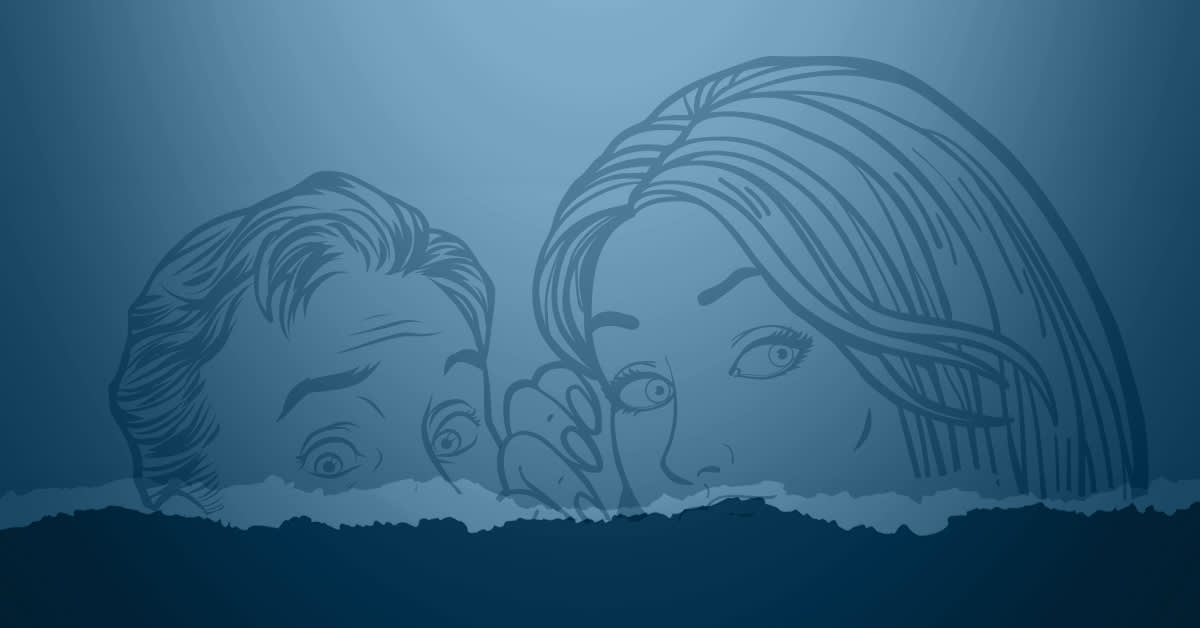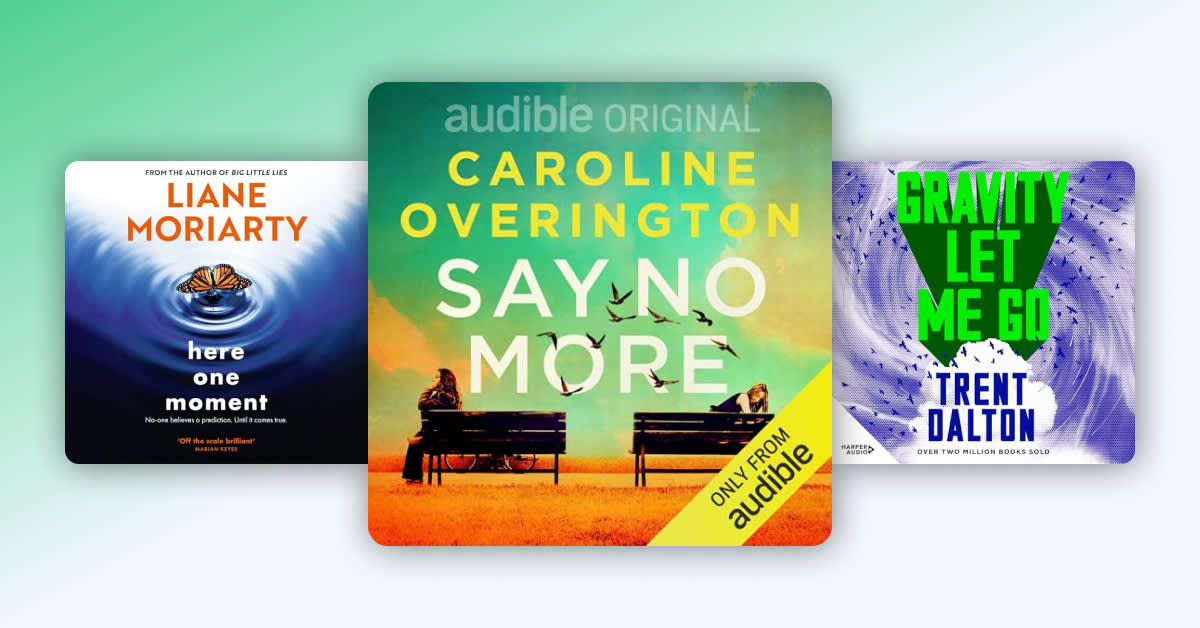This post was originally published on Audible.com.
If you’re an avid listener, chances are you’ve run through more audiobooks than you can count. Whether your favorites are can’t-pause thrillers, eye-opening audio docs, or out-of-this-world sci-fi sagas, you’ve likely built up quite the listening library. But can you recall the listen that changed your life? A truly inspirational book? Did it shape your worldview, offer up a new perspective, or bestow a pivotal life lesson?
As it seems we have increasing time for introspection and reflection these days, I’ve been thinking more and more often about the art—films, music, books, and more—that has left an indelible impact on me over the years. Naturally, this pondering turned to the world of audio, so I thought I’d ask my fellow Audible editors about what listen changed their lives. Their earnest and vulnerable answers offer insight into how remarkably transformative a listen can be—even offering comfort and companionship in the most difficult times.
The one and only William Blake first arrived in my ears, in fact, in the form of my favorite bands; the Norwegian black metal group Ulver released an album in late 1998 that “covered” the entirety of Blake’s 20th-century epic The Marriage of Heaven and Hell. Like the work inspiring it, the two-CD release was weird, baroque, and mind-expanding, cementing the band—and Blake—as lifelong loves of mine. Blake’s writing, as expressed in the songs’ lyrics, felt like a radical and semi-blasphemous reimagining of the Christian religion, which resonated with me for its visceral, rebellious, and creative thinking. The book itself coins so many phrases that remain commonplace today, like “The cut worm forgives the plow” and “The busy bee has no time for sorrow,” but one part in particular has rung in my ears for the last 20+ years: “If the doors of perception were cleansed every thing would appear to man as it is, Infinite. For man has closed himself up, till he sees all things thro' narrow chinks of his cavern.” At its core, Marriage is like Plato's allegory of the cave on LSD, so it should come as no surprise that it heavily inspired Huxley's Doors of Perception. For me, hearing Marriage set to music made me want to embrace the parts of myself that I love most about my adult self today; I hope that listening to Jason Rosette’s excellent narrative interpretation of the work awakens something in you too. —Sean T.
The first stanza of my favorite Sylvia Plath poem, “Elm,” ends with the line, “I do not fear it: I have been there.” It’s a reflection on the darkest moments that feel inescapable, presented with an oddly comforting reassurance: that pain is not permanent and that there are others who have felt those same flickers of emptiness. I first read Plath’s sole novel, The Bell Jar, in high school, but it wasn’t until I revisited it in college while struggling with my own mental health that I felt true kinship with protagonist Esther Greenwood’s quiet, observant nature—a timidity that masks a slew of obsessions, anxieties, and melancholy preoccupations. Plath’s gorgeous, visceral prose coupled with personal insight on neurosis and depression crafts a listen that is perhaps the most accurate depiction of daily life with a mood disorder that I have ever heard, while also proving a worthy meditation on womanhood and the exhausting push and pull of expectations and desire. Maggie Gyllenhaal’s contemplative, haunting cadence captures both the hollowness symptomatic of depression and the lilt of hope and light that still manages to crack through. Life-changing in its ability to reach out to listeners and empathize with them, The Bell Jar deftly explores the highs and lows of mental illness, while reminding us that we are never as alone or isolated as we might believe. —Alanna M.
It took me the better part of a decade to quit drinking, which is entirely average according to the many recovery memoirs I consumed in that period. In one of my favorites, Blackout, Sarah Hepola likens it to jumping off a diving board. A lot of us wait there for years, trying to figure out how to get in the water. The thing that got me off the board wasn’t a memoir, though, or rock bottom, or some momentous life decision. I don’t even remember why, one ordinary day last year, I downloaded This Naked Mind. All I know is that Annie Grace’s simple method, which neatly replaced my nearly lifelong love of booze with a different idea—that alcohol isn’t my friend and that, without it, I’m free—worked for me. Now 18 months sober, I haven’t listened to it again, but I like that it’s there in my library if I ever need a pep talk. Of course, your mileage may vary, and do consult with a doctor on how to quit safely. But if you’re struggling, it’s a simple tool to try—and if you jump, I promise the water’s lovely. —Kat J.
Over the past year or so, the word vulnerable has become THE calling card for self dev connoisseurs—myself included. But when I picked up Brené Brown’s magnum opus for the first time, it cracked me wide open. As a daughter of a mother who refused to even set foot outside without her “face” on, appearing to have it together at all times is deeply ingrained. Hearing Brené (we’re on a first-name basis now, at least in my mind) declare—via her trademark humor, honesty, and humility—that vulnerability is not only okay, but also essential to meaningful work, creativity, and relationships was a true revelation. I’m pretty sure I couldn’t make it through a pandemic without the messages, guidance, and truths that abound in this work. So far, so (relatively) good. 🤞🤞 —Courtney R.
When my husband died three years ago, I desperately sought out resources, books, groups-anything at all that would help me through the grieving process. When people hear the word widow, they imagine a silver-haired woman surrounded by her already-grown kids and grandkids. But there I was, still (relatively) young at 34, with only a few grays, and a 3-year-old daughter I would now have to raise on my own. Before I even started working at Audible, I was a fan of the Audicted podcast. When Editor Katie, now a dear colleague, mentioned this memoir of a young widow, my ears perked up. I couldn’t download it fast enough, and it was right on time for a road trip to visit family. As I sobbed down I-95 listening to Tembi’s gorgeous narration of her own eerily similar story, I felt like some of the shattered pieces of my heart were slowly being put back together. Tembi articulated so much of my anger, disbelief, and incredible sadness over my husband’s death, words I had been struggling for years to find. Being a widow is not a club I ever wanted to be member of, but after listening to From Scratch, I know I’m not alone, and I can draw on Tembi’s incredible strength for a little bit of my own. —Margaret H.
When asked to think of a transformative listen, my mind immediately shifted to one of the most infuriating scandals I’ve ever listened to: Bad Blood. This audiobook is a deep dive into the scam that was health tech company Theranos and its 'visionary' CEO, Elizabeth Holmes. The idea behind the company was a simpler way to conduct blood tests. The Theranos kits would only require a tiny amount of blood to produce many more insights than your traditional test. Here's the problem—the machine did not work, and Holmes and top executives knew it. In addition to rolling out machines that were producing invalid results, top company brass overstated the value and revenue of the company, among other shady practices.
Now why would such a wild story have changed my life? Well, among other things, it reinforced the idea that, sadly, justice is served (or not) depending on how wealthy you may be. Should Holmes and other conspirators be jailed for their obvious bad deeds? Of course! Will they likely end up paying fines and serving probation for a few years after waiting nearly a decade for a trial? It's probable. Stories like these are truly life changing because they show you how some systems, meant to be fair and equal, truly function. I can't think of anything more transformative than that. —Luis M.
I've listened to quite a few audiobooks over the years—on my commute, around the house, walking around, I’m always in a book-and so many of them have had a tremendous impact on my life. But when asked to think about a listen that changed my life, one immediately popped into my mind: Pass Through the Panic by Dr. Claire Weekes. Just under two hours long, and narrated by the woman who herself pioneered research in cognitive therapy, it was one of the most useful audiobooks I’ve ever listened to. Her calming (Aussie) voice combined with her obviously well-researched and firsthand knowledge reassured me and truly helped me to learn and hold onto ideas that have been hugely beneficial ever since. Like so many people (maybe now more than ever), I have struggled with anxiety and being a very sensitive, highly emotional person. Dr. Weekes talks the listener through nonjudgmental, no-nonsense, direct, and to-the-point lessons on how to cope with a variety of anxiety-related issues and demystifies the symptoms many people experience. Don’t get me wrong—Pass Through the Panic isn’t a catchall anxiety cure, but it’s a wonderful jumping off point for understanding what you’re dealing with, and figuring out first steps to begin to help yourself navigate life’s rough patches. —Madeline A.
I've spent many years as a recovering English major—generally avoiding all but the most literary of contemporary works. I had a stack of Jane Austen on my bedside table and was working my way through the so-called Canon. Even my wine-drinking book club only covered classics. I can't say what made me pick up Brave New World except that I remember my brother having an appropriately weathered-looking copy on his shelf growing up. But when I finally listened to it, it was revelatory-and the perfect slippery slope that sent me barreling into the genre fiction I love today. The Shakespearian rap battle (Huxley didn’t know it at the time, but that's totally what it is) between John and Mustapha Mond at the end seemed to reflect my very own personal contradictory feelings: my deep love of all things old, but my awareness that I was missing out on great stories of the present and future. Brave New World was my first foray into dystopian and science fiction, and set me off on a much greater journey of nondiscriminatory listening, which makes me not only better at this job, but generally just happier. —Emily C.
When I think back on the stories I’ve listened to that have left the biggest mark on my heart and mind, A Little Life is the one that rises to the top. It’s devastating. And beautiful. The four friends at its center, Willem, JB, Malcolm, and Jude (oh, man, especially Jude), are like permanent members of my family—the kind of attachment you feel for characters you come to love. This unbreakable bond came out of spending 30+ hours immersed in their lives with narrator Oliver Wyman’s voice subtly becoming a permanent part of my thoughts. His performance is gentle yet unflinching and a big part of what made it possible for me to not turn away, but to go deeper and endure all of the pain and love so brilliantly captured in Hanya Yanagihara’s storytelling. It will stay with me forever. —Tricia F.













